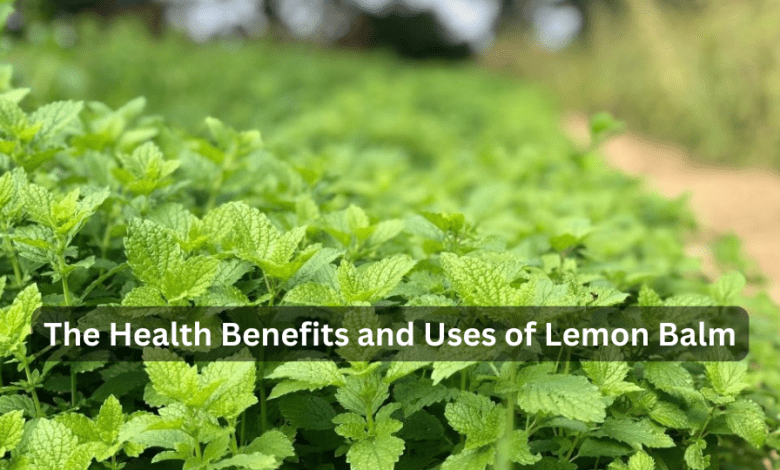The Health Benefits and Uses of Lemon Balm

Lemon balm (Melissa officinalis) is a perennial herb from the mint family that has been treasured for centuries for its wide range of health benefits. Known for its calming properties, this versatile plant has been traditionally used to treat conditions such as anxiety, insomnia, indigestion, and even cold sores. Native to southern Europe and the Mediterranean region, lemon balm has gained popularity worldwide due to its numerous medicinal uses. In this article, we’ll explore the health benefits, potential health risks, and proper dosage guidelines for incorporating lemon balm into your wellness routine.
What Is Lemon Balm?
Lemon balm is an aromatic herb with a pleasant lemon-scented fragrance. This plant, known by various names such as bee balm, sweet Mary, and garden balm, is valued for its medicinal properties and culinary uses. Its small white flowers attract bees and other pollinators, making it a favorite in herb gardens. Historically, lemon balm has been used as a natural remedy for over a thousand years, with references to its use in treating everything from nervous disorders to digestive problems. The herb can be consumed as a tea, applied topically as an ointment, or taken in supplement form.
Health Benefits of Lemon Balm
Lemon balm is increasingly recognized as a natural remedy that can improve various aspects of health. Here are some of the key benefits:
1. Reducing Anxiety and Stress
Lemon balm is well-known for its ability to reduce anxiety and improve mood. It is often used as a calming agent for those dealing with stress and nervous tension. Research shows that lemon balm extract can lower levels of anxiety and promote feelings of calmness. The herb contains compounds known as terpenes, which may activate brain circuits that help reduce agitation, especially in individuals suffering from dementia. Whether used as a tea or in supplement form, lemon balm offers a gentle, natural way to calm nerves.
2. Treating Insomnia
For individuals struggling with insomnia or sleep disorders, lemon balm may offer a natural solution. When combined with other herbs like valerian, lemon balm can enhance sleep quality. Studies have shown that drinking lemon balm tea or taking a supplement containing the herb can lead to more restful sleep. Its mild sedative properties can help induce relaxation, making it easier to fall asleep.
3. Easing Digestive Problems
Lemon balm has long been used to alleviate digestive discomfort, including issues like bloating, indigestion, and gas. The herb contains compounds that relax the smooth muscles of the digestive tract, providing relief from gastrointestinal distress. By drinking lemon balm tea or taking it as a supplement, people with irritable bowel syndrome (IBS) or other digestive issues may experience reduced symptoms.
4. Healing Cold Sores
One of the most effective uses of lemon balm is its ability to heal cold sores caused by the herpes simplex virus (HSV). Ointments and creams containing lemon balm extract have been found to shorten the duration of cold sores and reduce the severity of symptoms. Applying lemon balm topically to the affected area can promote faster healing and reduce the risk of further outbreaks.
5. Easing Menstrual Pain
For women dealing with menstrual cramps and other premenstrual syndrome (PMS) symptoms, lemon balm may provide relief. The herb contains rosmarinic acid, a compound that has been shown to reduce the severity of menstrual symptoms such as pain, cramping, and fatigue. Whether taken as a tea or supplement, lemon balm can be a useful remedy for managing the discomfort associated with menstruation.
Health Risks and Considerations
While lemon balm is generally considered safe for most people, there are some health risks and considerations to be aware of:
1. Interactions with Medications
If you are taking certain medications, you should consult a healthcare provider before using lemon balm. Specifically, those taking thyroid medications or sedatives for insomnia should be cautious, as lemon balm may interact with these drugs. The herb’s sedative effects can be amplified when combined with other medications, which could lead to excessive drowsiness or other side effects.
2. Possible Interaction with HIV Medications
There is limited research on how lemon balm may interact with HIV medications, but some experts recommend caution. Since the exact effects are not yet fully understood, it’s important to consult a healthcare professional if you are taking medications for HIV.
3. Glaucoma Concerns
Some reports suggest that lemon balm may increase intraocular pressure, which could negatively impact individuals with glaucoma. If you have a history of eye conditions or are at risk for glaucoma, it’s best to seek medical advice before using lemon balm.
Dosage and Usage Guidelines
Although there is no official recommended daily allowance (RDA) for lemon balm, it is considered safe for most people when used in moderation. According to the American Herbal Products Association, lemon balm is classified as a “class 1” herb, meaning it is safe to consume under appropriate conditions. Here are some general guidelines for dosage:
- Capsules and Extracts: Lemon balm extract is available in doses ranging from 300 to 1,600 milligrams. Clinical studies suggest that doses of around 900 mg may cause reduced alertness, so be cautious when using high doses, especially if you plan to operate machinery or drive.
- Topical Creams: For skin applications, creams containing 1% lemon balm extract can be used to treat cold sores. Apply the cream directly to the affected area as needed.
- Lemon Balm Tea: To brew a lemon balm tea, steep 1.5 to 4.5 grams of dried lemon balm leaves in 150 milliliters of hot water. You can drink this tea several times a day to relieve stress, improve digestion, or promote better sleep.
- Fresh and Dried Leaves: Up to 10 grams of fresh or dried lemon balm leaves can be consumed per day. The leaves can be added to salads, smoothies, or herbal teas for a refreshing and health-boosting addition.
As with any supplement or herb, it’s important to talk to your doctor before starting a lemon balm regimen to ensure it’s safe and appropriate for your individual health needs.
Growing and Harvesting Lemon Balm
Lemon balm is not only a medicinal herb but also a popular plant for home gardens. It thrives in cool weather and can be grown in pots or garden beds. The leaves can be harvested and used either fresh or dried. Dried lemon balm leaves should be stored in an airtight container and kept out of direct sunlight to preserve their potency for up to one year.
Conclusion
Lemon balm is a valuable herb that offers numerous health benefits, from relieving anxiety and stress to treating insomnia, digestive issues, and cold sores. It has been used for centuries as a natural remedy and continues to gain popularity in modern herbal medicine. While generally safe, it’s important to be mindful of potential interactions with medications and to follow appropriate dosage guidelines. Whether you choose to enjoy lemon balm as a tea, supplement, or topical ointment, this herb has the potential to enhance your overall well-being in a natural and gentle way.




